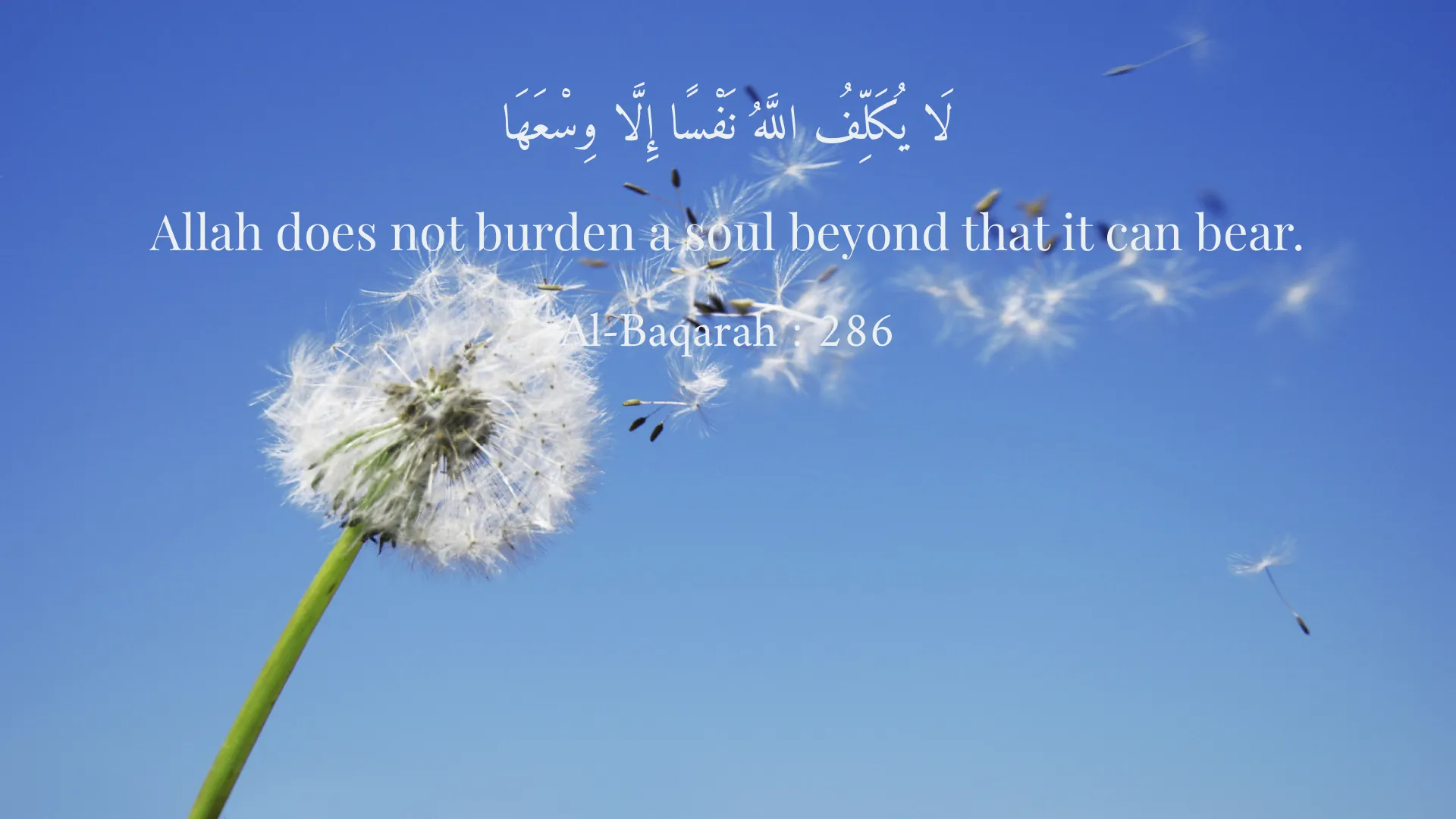Quranic Answer

Recognizing one's own faults is a cognitive and personal process that can signify personal growth and maturity. This essential act of introspection is not merely a passive acknowledgment of flaws but an active engagement in self-discovery and improvement. It involves an ongoing effort to analyze one's behavior, motivations, and the consequences of actions taken. The journey of understanding oneself is multi-faceted and deeply intertwined with one's values, beliefs, and experiences. In this exploration, many individuals turn to spiritual teachings for guidance, and within these texts lies profound wisdom that can facilitate personal transformation. In the Holy Quran, Allah mentions in Surah Al-Baqarah, verse 286, 'Allah does not burden a soul beyond that it can bear.' This profound statement underscores the principle of personal responsibility and individual capacity. It suggests that every person is equipped with the strength and resilience needed to confront their weaknesses and challenges. By acknowledging this divine reassurance, individuals can cultivate a sense of empowerment, which motivates them to take action toward self-improvement. The acknowledgment of one's capabilities plays a crucial role in self-awareness, as it enables individuals to realistically assess their strengths and weaknesses. When a person can see their flaws and endeavors to work on them, it signals a deeper understanding of themselves and the realities of their lives. This level of self-awareness often leads to a more authentic existence; individuals no longer live in denial of their shortcomings but rather embrace them as part of their holistic existence. They begin to view their flaws not as burdens but as opportunities for growth and development. Such a perspective fosters resilience and a willingness to engage with life more fully, embracing both successes and failures as integral parts of the human experience. Moreover, the Quran further states in verse 119 of Surah At-Tawbah, 'And indeed, there was for them in that a reminder for whoever had a heart or who listened while he was present.' This verse emphasizes the importance of reflection and mindfulness. To be present and aware of one’s own state is a powerful practice that can lead to spiritual growth. Reflecting on one’s actions and recognizing their consequences not only enriches one’s understanding of themselves but also enhances their empathy towards others. It paves the way for spiritual awakening—where recognition of one’s flaws serves as the catalyst for transformation and deeper connection with the divine. In a world often characterized by distractions and superficial interactions, the call to reflect on our inner selves prompts us toward a more meaningful existence. Engaging in self-examination and identifying one’s shortcomings takes courage and honesty. Yet, it is this active engagement that allows for the exploration of a better path in life. The process of self-correction is not only about personal advancement but also about fostering better relationships with others. When individuals strive to address and rectify their flaws, they demonstrate accountability and a commitment to personal growth. This journey of improvement invariably leads to better connections with family, friends, and the community overall. Improving one's personal state has ripple effects. As individuals work on themselves—overcoming their flaws and striving to be better—they naturally influence those around them. Mutual respect, understanding, and kindness become the foundational elements of their relationships. Additionally, those who witness the growth and transformation of others often feel inspired to embark on their own journeys of self-improvement. The interconnectedness of human experiences means that personal growth can foster collective enhancement. Moreover, the spiritual aspect of this journey cannot be overlooked. The act of acknowledging one’s flaws and striving to improve oneself inherently promotes a deeper connection with God. When individuals take responsibility for their flaws and actively seek to rectify them, they align their actions with the teachings of the Quran, fostering a closer relationship with their Creator. The ultimate aim is not just personal development, but rather the evolution into a more complete human being. The Quran encourages believers to engage in the pursuit of self-betterment continuously, suggesting that true fulfillment stems from a harmonious relationship with oneself, others, and God. In conclusion, recognizing one's own faults is a vital part of personal growth and maturity. The Quran provides invaluable guidance that emphasizes the importance of self-awareness, responsibility, and reflection. By engaging in this process, individuals not only work toward personal improvement but also enhance their relationships with others and solidify their connection with God. The journey of self-discovery is both challenging and rewarding; it leads individuals toward a path of greater understanding, compassion, and fulfillment in life. Therefore, the act of recognizing and addressing one’s flaws stands as a cornerstone of personal and spiritual development, enriching the individual and the wider community.
Related Verses
لَا يُكَلِّفُ اللَّهُ نَفْسًا إِلَّا وِسْعَهَا
Allah does not burden a soul beyond that it can bear.
Al-Baqarah : 286
وَلَقَدْ كَانَ لَهُمْ فِي ذَٰلِكَ لَذِكْرَى لِمَنْ كَانَ لَهُ قَلْبٌ أَوْ أَلْقَى السَّمْعَ وَهُوَ شَهِيدٌ
And indeed, there was for them in that a reminder for whoever had a heart or who listened while he was present.
At-Tawbah : 119
Short Story
One day, Maryam was looking at herself in the mirror and realized that some of her traits needed change. She recalled the verses of the Quran and decided instead of ignoring those flaws, she would work on improving herself. Every day she spent a few minutes reflecting and praying. Maryam noticed that as she worked towards her personal growth, not only did she feel better, but her relationships with her friends also improved.